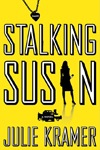Today, our guest blogger is Julie Kramer, a freelance network news producer. Her debut thriller, STALKING SUSAN, won the RT Reviewers Choice Award for Best First Mystery, the Minnesota Book Award for genre fiction, and was a finalist for the Mary Higgins Clark Award. It’s also been nominated for Best First Novel in both the Anthony and Barry Awards.
Her second book, MISSING MARK, is available now from Doubleday.
by Julie Kramer
 If authors are going to take readers inside a fictional version of their own world, it helps if that world holds some natural intrigue to outsiders.
If authors are going to take readers inside a fictional version of their own world, it helps if that world holds some natural intrigue to outsiders.
That’s where I lucked out, working as a career producer in the increasingly desperate world of TV news. By coming clean about some of my profession’s flaws, my debut, STALKING SUSAN, (recently out in paperback) takes a little of the mystery out of the media. And my readers seem to appreciate the insider knowledge on how news decisions are made to how hidden cameras work.
Of course, some of my news colleagues wish I hadn’t been quite so candid. They ask: Did you have to tell them all that stuff about ratings? Did you have to tell them “If it bleeds it leads?”
In my sequel, MISSING MARK, my TV reporter heroine answers a want ad reading “Wedding Dress For Sale: Never Worn” and is drawn into a dangerous missing person case during sweeps month.
 As a journalist, I’ve covered numerous missing people and I never know how the cases are going to turn out. Some victims, heartbreakingly, end up dead (Dru Sjodin – North Dakota). Others, miraculously, turn up alive. (Shawn Hornbeck – Missouri) Some, hauntingly, are never found. (Jodi Huseintruit -Iowa) Some are abducted. (Jacob Wetterling – Minnesota) Others stage their own abduction. (Audrey Seiler – Wisconsin) I used MISSING MARK as an opportunity to show readers how newsrooms decide which missing people get publicity and which don’t. It can be a provocative discussion.
As a journalist, I’ve covered numerous missing people and I never know how the cases are going to turn out. Some victims, heartbreakingly, end up dead (Dru Sjodin – North Dakota). Others, miraculously, turn up alive. (Shawn Hornbeck – Missouri) Some, hauntingly, are never found. (Jodi Huseintruit -Iowa) Some are abducted. (Jacob Wetterling – Minnesota) Others stage their own abduction. (Audrey Seiler – Wisconsin) I used MISSING MARK as an opportunity to show readers how newsrooms decide which missing people get publicity and which don’t. It can be a provocative discussion.
When a child disappears, the media goes into action. And those actions, from broadcasting Amber Alerts to interviewing sobbing parents, are fairly predictable. Children should never be missing, so missing children are news.
It’s when adults go missing that the situation gets tricky because grownups are allowed to leave without sharing their plans with friends and family. And hey, often enough they do show up just days later. Back from Vegas. Sheepish. So without signs of foul play, there’s some controversy in how long the police wait to investigate a missing adult. Often journalists take their cues from law enforcement. If the cops don’t appear to be taking a case seriously, the media might not either. Some states, such as Minnesota have recently passed legislation like “Brandon’s Law,” requiring police to more aggressively investigative missing adults deemed to be “endangered.”
Whether a missing person gets news coverage can depend on how slow the news day is, or if a holiday is approaching and other news events come to a standstill. I don’t think it’s any coincidence that lots of missing people who became household names disappeared near holidays. Remember Lacy Peterson and Christmas?
I’ll never forget the time a friend of mine decided to enlist the help of a Denver Private Investigator to solve a missing person case. There are lots of reasons why people go missing and often the mysteries are never truly solved, but a private investigator may be able to use surveillance techniques to help.
How accessible the victim’s family is for interviews and photographs can also make a difference in publicity. That’s content. And newsrooms seek content. Without a family pushing the police to search and the media to broadcast descriptions, the missing tend to stay missing. And until someone reports them gone, the missing aren’t even considered missing. That’s why serial killers who target prostitutes or the homeless tend to stay under the radar longer.
One of the most controversial aspects of missing people and the media is why attractive, white women seem to get the most national media attention. There’s no good answer for that. I know for a fact, news managers don’t consciously decide coverage based on the victim’s appearance. But if you look at the faces of the missing who have gone viral, that seems to be a common denominator.
 Certainly it’s more understandable that missing women get more coverage than missing men because, historically, missing women are more likely to be in jeopardy. But as for appearance, it might be one of those chicken vs. the egg quandaries. Are attractive victims more likely to get publicity because that’s who viewers watch and that’s who draws ratings? Is the media merely giving the public what it wants? Or is the media deciding what the public wants? As a journalist and as a viewer, I don’t know the answer to that debate. But I know newsrooms are troubled by it.
Certainly it’s more understandable that missing women get more coverage than missing men because, historically, missing women are more likely to be in jeopardy. But as for appearance, it might be one of those chicken vs. the egg quandaries. Are attractive victims more likely to get publicity because that’s who viewers watch and that’s who draws ratings? Is the media merely giving the public what it wants? Or is the media deciding what the public wants? As a journalist and as a viewer, I don’t know the answer to that debate. But I know newsrooms are troubled by it.
When I started writing what eventually was titled MISSING MARK, I had in my mind that the bride was the missing character. But after my neighbor, a West Point cadet home on leave, went missing, I decided to make my victim a man to discuss some of the challenges missing men face.
So instead of Here Comes The Bride, my story became There Goes The Groom.
A MISSING MARK case in the headlines recently involves South Carolina governor Mark Sandford going AWOL to visit his Argentina mistress. If you dropped that kind of plot in a novel, critics might call it improbable. But that’s just one example of truth being stranger than fiction.
What do you think about how the media covers missing people? What do you think about how they’re portrayed in fiction?
 something so rarely provided us in our real lives – justice. As a crime writer I feel it is my duty to play fair with the reader but that doesn’t always mean that at the end of my books the perpetrators get their ‘comeuppance’.
something so rarely provided us in our real lives – justice. As a crime writer I feel it is my duty to play fair with the reader but that doesn’t always mean that at the end of my books the perpetrators get their ‘comeuppance’. 





